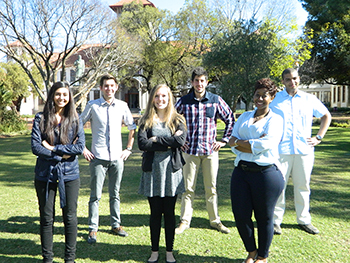Latest News Archive
Please select Category, Year, and then Month to display items
02 January 2025
|
Story Gerda-Marie van Rooyen
|
Photo Supplied
 Leading the research in South Africa is Prof Linus Franke from the Department of Soil, Crop and Climate Sciences.
Leading the research in South Africa is Prof Linus Franke from the Department of Soil, Crop and Climate Sciences.
Scientists are actively pursuing the successful breeding of diploid hybrid potatoes from inbred lines. This is expected to revolutionise potato breeding as it holds the key to rapid genetic progress. It will introduce new varieties for commercialisation through seed. Currently, existing potato variants have a gene that renders self-pollinated seeds infertile.
Prof Linus Franke, an academic in the Department of Soil, Crop and Climate Sciences at the UFS, is leading the research in South Africa. “This technology allows the production of genetically uniform potato seed that is easy to transport and largely disease-free.” He says this differs from conventional breeding whereby only vegetative propagation is possible due to tetraploid varieties in potatoes. It also risks carrying pests and diseases from one generation to the next – leading to the accumulation of pests and diseases with each round of multiplication.
Seed innovation
Prof Franke explains that Solynta BV, a seed company based in the Netherlands that produces potato varieties that can be grown from seed, has included South Africa in their research efforts because it is one of Africa’s largest producers and exporters. Through his academic relationship with Wageningen University and Research, a Dutch institution renowned for its agricultural endeavours and food production, the UFS became involved in researching hybrid potatoes grown from seed.
Diploid seeds containing two sets of chromosomes allow easier gene manipulation to increase predictability and speedier genetic progress. The breeding approach enables the incorporation of tolerance to pests, diseases, abiotic stresses (cold, heat, drought) and other desired genetic traits.
Although Prof Franke is optimistic about this research, he is not blind to disadvantages. “Potato seeds are tiny and have little energy reserves, making it harder to grow potatoes from seed than from tubers.” He says potatoes from seed will take longer to cultivate than tubers, as farmers need to grow plantlets from seeds first, adding six weeks to the growing period. “It is possible that commercial farmers can grow potatoes directly from seed. Alternatively, perhaps more likely, specialised growers will produce tubers of potatoes from seed; these tubers are then sold as seed tubers to other potato farmers, who then continue their normal practices of producing potatoes for the market from tubers.”
Financial benefits
Prof Franke says farmers have reason to get excited. “Seed potatoes will reduce input costs, as varieties with enhanced tolerance to pests and diseases require less pesticides. Planting one hectare of potatoes requires three to four tonnes of potato tubers, but only one 25 g packet of potato seeds.” Since potatoes are a more valuable commodity than maize, this technology might also increase farmers’ income potential.
UFS 2015 group for Stanford Sophomore College announced
2015-06-09

Photo (from left to right):
Farzaana Adam, Cornel Vermaak, Anje Venter, Tristan van der Spuy, Precious Mokwala and Naushad Mayat. |
Six second-year students from the UFS were selected to attend a two-week seminar at the Stanford Sophomore College in August/September 2015.
The Stanford Sophomore College (SoCo) is an immersive learning experience. Participants attend class meetings during the morning while afternoons include class activities, explorations of Stanford University (USA), field trips, and other organised events.
Since 2012 UFS students have been invited to apply. This year’s successful applicants were recently announced. They are:
• Farzaana Adam
B. Accounting student
Attending the SoCo seminar on Great Ideas in Computer
• Naushad Mayat
Medicine student
Attending the SoCo seminar on HIV/AIDS Epidemics
• Precious Mokwala
Social Sciences student
Attending the SoCo seminar on Photography: Truth or Fiction
• Tristan van der Spuy
B. Accounting student
Attending the SoCo seminar on A Walk Down Wall Street
• Anje Venter
Actuarial Science student
Attending the SoCo seminar on New Millenium Mix: Cross between Race and Culture
• Cornel Vermaak
Medicine student
Attending the SoCo seminar on The Intersection between Arts and Science
SoCo group of 2014 announement:
http://www.ufs.ac.za/templates/news-archive-item?news=4019
2012:
http://www.ufs.ac.za/templates/news-archive-item?news=2344